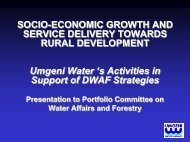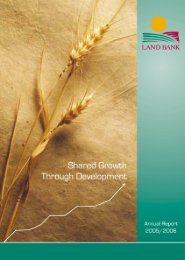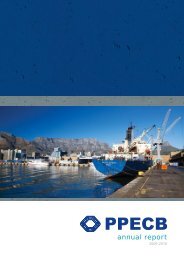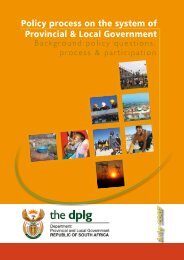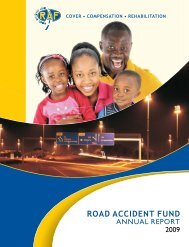Human Settlements Review - Parliamentary Monitoring Group
Human Settlements Review - Parliamentary Monitoring Group
Human Settlements Review - Parliamentary Monitoring Group
Create successful ePaper yourself
Turn your PDF publications into a flip-book with our unique Google optimized e-Paper software.
<strong>Human</strong> <strong>Settlements</strong> <strong>Review</strong>, Volume 1, Number 1, 2010<br />
5 The legislative and policy<br />
context<br />
is protected and that development that does<br />
occur is both sustainable, and justifiable:<br />
South Africa has legislation and policy that<br />
aims to protect the environment and support<br />
sustainable development. Examples include<br />
the South African Constitution and the National<br />
Environmental Management Act (NEMA)<br />
which are discussed briefly below.<br />
South African Constitution<br />
The South African Constitution contains a Bill<br />
of Rights that enshrines the rights of all people<br />
in South African and affirms the democratic<br />
values of human dignity, equality and freedom.<br />
The Bill has sections covering equality, human<br />
dignity, privacy, freedom of religion belief<br />
and opinion, environment, property, housing,<br />
healthcare, food, water and social security,<br />
children, education, language and culture.<br />
Through a section on equality, the Bill requires<br />
that all people have full and equal enjoyment<br />
of these rights and freedoms:<br />
Everyone is equal before the law and has the<br />
right to equal protection and benefit of the law.<br />
24. Environment<br />
Everyone has the right<br />
a. to an environment that is not harmful<br />
to their health or well-being; and<br />
b. to have the environment protected,<br />
for the benefit of present and future<br />
generations, through reasonable<br />
legislative and other measures that<br />
i. prevent pollution and<br />
ecological degradation;<br />
ii. promote conservation; and<br />
iii. secure ecologically<br />
sustainable development<br />
and use of natural resources<br />
while promoting justifiable<br />
economic and social<br />
development<br />
Sustainable development and the protection<br />
of the environment is therefore a constitutional<br />
obligation, and government and society must<br />
ensure that this is fulfilled through ‘reasonable<br />
legislative and other measures’.<br />
Equality includes the full and equal enjoyment<br />
of all rights and freedoms. To promote the<br />
achievement of equality, legislative and<br />
other measures designed to protect or<br />
advance persons, or categories of persons,<br />
disadvantaged by unfair discrimination may<br />
be taken.<br />
Environmental rights in the Bill of Rights include<br />
the right to an environment that supports health<br />
and well being. It also requires legislation to<br />
be developed to ensure that the environment<br />
1<br />
http://www.footprintnetwork.org/en/index.php/GFN/page/world_footprint/<br />
2<br />
<strong>Human</strong> Development Report 2006, United Nations Development Programme<br />
3<br />
Section 9 of the South African Constitution<br />
Section 24 also refers to a requirement to<br />
‘secure ecologically sustainable development<br />
and use of natural resources while promoting<br />
justifiable economic and social development’.<br />
Within the context of the Bill of Rights,<br />
justifiable economic and social development<br />
can be interpreted to define development that<br />
promotes the achievement of other rights in<br />
the Constitution such as the equality, housing,<br />
healthcare, food, water and education. Within<br />
this paper this interpretation is used to suggest<br />
that development that helps to fulfill<br />
38


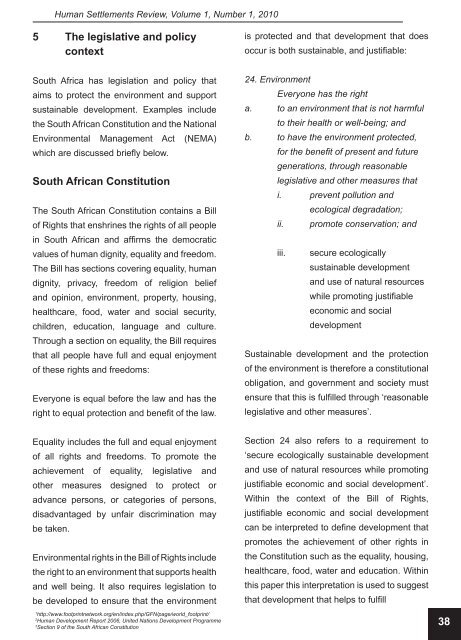
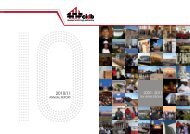
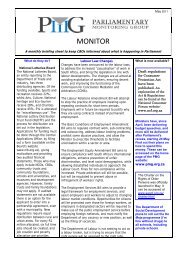
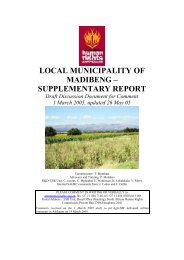
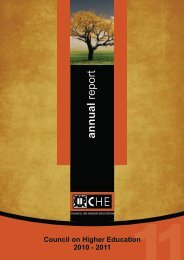
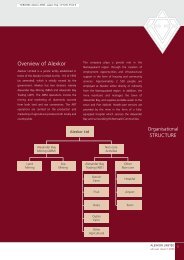
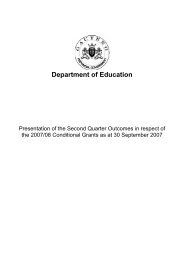
![National Research Foundation Annual Report 2008 / 2009 [Part 2]](https://img.yumpu.com/49774036/1/177x260/national-research-foundation-annual-report-2008-2009-part-2.jpg?quality=85)
